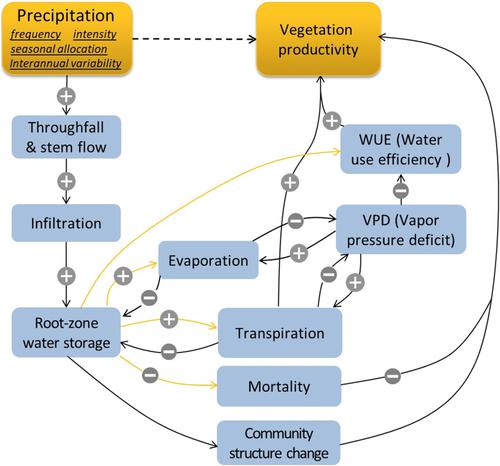当前位置:
X-MOL 学术
›
WIREs Water
›
论文详情
Our official English website, www.x-mol.net, welcomes your feedback! (Note: you will need to create a separate account there.)
Impact of temporal precipitation variability on ecosystem productivity
WIREs Water ( IF 8.2 ) Pub Date : 2020-09-08 , DOI: 10.1002/wat2.1481 Junzhi Liu 1, 2 , Xuanlong Ma 2, 3 , Zheng Duan 4 , Jingchao Jiang 5 , Markus Reichstein 2 , Martin Jung 2
WIREs Water ( IF 8.2 ) Pub Date : 2020-09-08 , DOI: 10.1002/wat2.1481 Junzhi Liu 1, 2 , Xuanlong Ma 2, 3 , Zheng Duan 4 , Jingchao Jiang 5 , Markus Reichstein 2 , Martin Jung 2
Affiliation

|
Projected increases in temporal precipitation variability, including intra‐annual and interannual variability, will likely have important impacts on terrestrial ecosystem productivity. The direction and magnitude of these impacts and how they vary across biomes, however, remain largely uncertain. Here, we review published literature that investigated the effect of different characteristics of temporal precipitation variability on vegetation productivity. We first reviewed commonly used methods, including manipulation experiments, process‐based modeling, and data‐driven analysis, and further discussed their strengths and limitations. Then, we summarized state‐of‐the‐art research on this topic by categorizing the results based on the characteristics of temporal precipitation variability. Given the same amount of growing season precipitation, a more extreme precipitation regime, characterized as fewer but larger precipitation events, tends to have a negative impact on vegetation productivity of most ecosystems except xeric grasslands and wet‐cold forests. Precipitation in the early growing season was found to be particularly important to vegetation productivity. Greater interannual precipitation variability tends to decrease vegetation productivity, but the reported patterns are complex, as both concave‐up and concave‐down precipitation‐productivity relations were found. Despite the progress made so far, critical challenges and knowledge gaps remain, such as the global‐scale impacts across different biomes, the role of biological adaption, and the contribution of individual precipitation events. Future research needs to combine manipulation experiments across a broad spectrum of ecosystem types and environmental gradients with model‐data integration strategies to disentangle the interactions between abiotic and biotic factors controlling vegetation responses to precipitation variability.
中文翻译:

时间降水变化对生态系统生产力的影响
预计的季节性降水变化(包括年内和年际变化)的增加可能会对陆地生态系统生产力产生重要影响。但是,这些影响的方向和程度以及它们在整个生物群落中的变化方式仍然不确定。在这里,我们回顾了已发表的文献,这些文献调查了不同时期降水变化特征对植被生产力的影响。我们首先回顾了常用的方法,包括操作实验,基于过程的建模和数据驱动的分析,然后进一步讨论了它们的优势和局限性。然后,我们根据时间降水变异性的特征对结果进行分类,总结了有关该主题的最新研究。在生长季节降水量相同的情况下,更为极端的降水方式,其特点是降水事件较少但数量较大,但往往会对除干旱草原和湿冷森林以外的大多数生态系统的植被生产力产生负面影响。人们发现生长早期的降水对植被生产力特别重要。较大的年际降水变化往往会降低植被生产力,但报告的模式很复杂,因为发现了凹-上和凹-下降水-生产力关系。尽管迄今已取得了进展,但仍然存在严峻的挑战和知识差距,例如不同生物群落对全球的影响,生物适应的作用以及个别降水事件的贡献。
更新日期:2020-10-19
中文翻译:

时间降水变化对生态系统生产力的影响
预计的季节性降水变化(包括年内和年际变化)的增加可能会对陆地生态系统生产力产生重要影响。但是,这些影响的方向和程度以及它们在整个生物群落中的变化方式仍然不确定。在这里,我们回顾了已发表的文献,这些文献调查了不同时期降水变化特征对植被生产力的影响。我们首先回顾了常用的方法,包括操作实验,基于过程的建模和数据驱动的分析,然后进一步讨论了它们的优势和局限性。然后,我们根据时间降水变异性的特征对结果进行分类,总结了有关该主题的最新研究。在生长季节降水量相同的情况下,更为极端的降水方式,其特点是降水事件较少但数量较大,但往往会对除干旱草原和湿冷森林以外的大多数生态系统的植被生产力产生负面影响。人们发现生长早期的降水对植被生产力特别重要。较大的年际降水变化往往会降低植被生产力,但报告的模式很复杂,因为发现了凹-上和凹-下降水-生产力关系。尽管迄今已取得了进展,但仍然存在严峻的挑战和知识差距,例如不同生物群落对全球的影响,生物适应的作用以及个别降水事件的贡献。



























 京公网安备 11010802027423号
京公网安备 11010802027423号